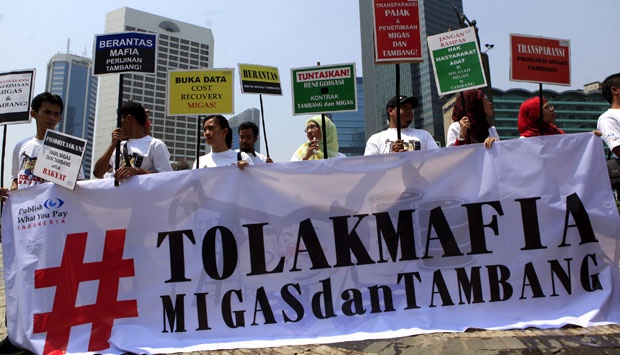
TEMPO.CO, Jakarta - The call to fight the oil and gas syndicate has been launched once again, this time by the government of President Joko Widodo. This is good news, especially since Energy Minister Sudirman Said will be joined by the new chief of the Upstream Oil and Gas Business Task force (SKK Migas), Amien Sunaryadi and the newly appointed chairman of the Oil and Gas Management Reform Team, economist Faisal Basri. We have high hopes that this formidable trio will be able to stop, or at least minimize, the mafia's actions that have caused immense losses to the state. Amir and Faisal are known as fierce fighters of graft and corruption.
Battling corruption in a business as massive as oil and gas is unlikely to be achieved by one or two persons. SKK Migas, for example, handles the sale transactions of state oil and gas, to the tune of Rp300 trillion annually. This does not include the recovery costs of another Rp100 trillion. Such a profitable crime is sure to involve a strong network of people from different backgrounds. Unfortunately, we get the impression that this syndicate has been 'allowed' to remain mysterious and far from the reach of the law. So far, we have not seen genuine efforts on the part of the government to reveal, let alone to impede their activities.
Dahlan Iskan, the minister in charge of state-owned enterprises under President Susilo Bambang Yudhoyono, once suggested the idea of dissolving Petral Pertamina Energy Trading Limited which is suspected to be one of the biggest source of leakages in Indonesia's oil importation. But Dahlan's efforts never went beyond the realm of discussion and debate. Perhaps because the then Coordinating Minister for the Economy, Hatta Rajasa, wanted Petral audited, not dissolved.
The government's reluctance in getting close to this syndicate raises the question of whether any of its people are involved. Last September, for example, former Energy and Mineral Resources Minister Jero Wacik was indicted by the Corruption Eradication Commission (KPK) for his involvement in a number of projects taken up by his ministry. But it is too early to link Wacik with the oil and gas mafia. On the other hand, Rudi Rubiandini, the former SKK Migas chief who in April was sentenced to seven years in prison, seems to be more closely involved with this syndicate. He accepted billions of rupiah from two companies: Kernel Oil Singapore and Fossus Energy. A more intensive study of the Rudi case will no doubt expose a mapping of the mafia's work pattern.
The oil-gas syndicate has not only ventured into the sales of fuel, but also in its importation. The case involving the imports of Zapati oil in 2009 when Ari Soemarno was CEO of Pertamina, is a case in point. The oil-gas mafia remained nothing more than a shadow. Yet, it is a lethal shadow, given that analysts predict some Rp20-25 trillion in annual losses to the state. The team to reform the oil-gas management team must expose what this mysterious crime group is all about.
With its wide scope of responsibilities, this team basically should audit the oil and gas industry in Indonesia. Besides reviewing the upstream to downstream licensing process, it must come up with recommendations on how to restructure the oil and gas institution itself. There's also the legislation on oil and gas that needs to be looked over, to amend clauses that have so far provided loopholes for rent seekers. But it is the follow-up to the team's recommendations that will be key to the seriousness of the intent to sweep clean the oil and gas industry. And that will mostly depend on SKK Migas. The changes in this oil and gas regulatory body as promised by its new chief, Amien Sunaryadi, must no longer be an option.
Undoubtedly, Energy Minister Sudirman Said has his hands full because in addition to the problem of the oil and gas mafia, he must do something about inefficient oil wells, ensure that the country's oil reserves stay full and build much-needed infrastructure for the gas industry. By no means is his job an easy one, but the newly appointed officials are the people's new hope. They must remember that the public has shouldered the burden long enough, particularly with the recent rise in the price of fuel oil. (*)























